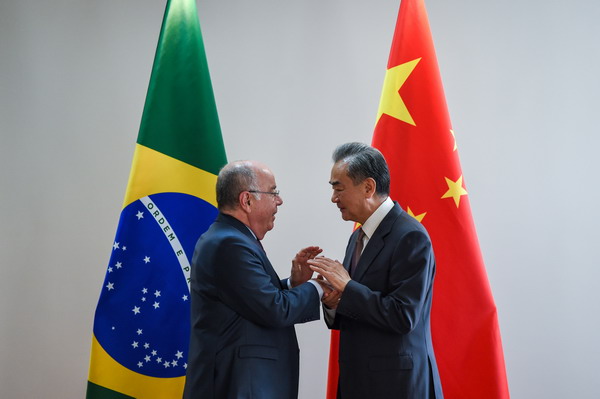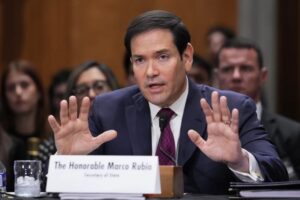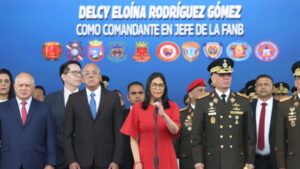
Published 06/11/2024 14:39 | Edited 06/13/2024 15:47
During the first working session of the BRICS Foreign Ministers’ meeting held in Nizhny Novgorod, Brazilian Foreign Minister Mauro Vieira and Chinese Foreign Minister Wang Yi presented on Monday ( 10) speeches that highlighted both global challenges and opportunities for cooperation between BRICS countries and developing countries.
Both ministers highlighted the seriousness of the current global scenario. Vieira mentioned hunger, poverty, global warming, conflicts and humanitarian catastrophes, while Wang focused on the protracted crises in Ukraine and Gaza, as well as new challenges such as cybersecurity and climate change. Both criticized the marginalization of the United Nations and the violation of international law, but Wang was more specific in his criticism of unilateral sanctions and protectionist barriers imposed by certain countries to maintain their hegemony.
Focus on cooperation and cohesion
The importance of international cooperation and strengthening bilateral relations were common points in the speeches. Vieira highlighted the need for cohesion among BRICS members, based on the “BRICS spirit”, which includes mutual respect, sovereign equality, solidarity, openness and inclusion. Wang Yi highlighted BRICS+ as a vital platform for dialogue between emerging markets and developing countries, promoting South-South cooperation.
Both ministers defended reforms in international institutions. Vieira highlighted the need to strengthen multilateralism through a comprehensive reform of the UN, especially the Security Council. Wang Yi also addressed the need to improve global governance, proposing three main points: upholding universal security, prioritizing development, and upholding equity and justice.
Vieira highlighted two main topics: the issue of local currencies and payment instruments, defended by President Lula, and the expansion of the BRICS. Wang Yi emphasized the importance of BRICS+ as a dynamic force for BRICS development and South-South cooperation.
Expansion of BRICS and BRICS+
Vieira addressed the expansion of the BRICS, mentioning the discussion around the model of partner countries and highlighting the need to define principles, criteria and procedures for the association. He emphasized the importance of reaching consensus at the upcoming Kazan Summit on these aspects. He reaffirmed Brazil’s commitment to the BRICS, considering it indispensable for promoting the interests of the Global South.
Wang Yi, on the other hand, highlighted the strategic importance of the BRICS and Developing Countries Foreign Ministers’ Dialogue (BRICS+), which includes 12 large developing countries with regional influence. This model, according to Wang, facilitates unity and cooperation between developing countries, increasing the influence of the Global South. Wang Yi highlighted the collective rise of emerging markets and developing countries, driving a multipolar world.
Vieira ended his speech by reaffirming Brazil’s commitment to working constructively under the guidance of the current BRICS presidency to complete the assigned tasks, valuing the group’s role in promoting the interests of the Global South. Wang Yi also emphasized the importance of continuing to promote political solutions to international conflicts and reforms in the international financial system, as well as strengthening cooperation in areas such as digital economy and infrastructure.
The speeches by Mauro Vieira and Wang Yi in Nizhny Novgorod reinforce the position of the BRICS as an essential platform to face global challenges and promote cooperation between countries in the Global South. The meeting marked a crucial moment for the group, expanding its influence and facing global challenges with a collective and integrated vision, showing the importance of a unified response to contemporary crises and opportunities for joint development.
Mauro Vieira also welcomed the group’s new members, including the Foreign Ministers of Egypt, Ethiopia, Iran and the United Arab Emirates. Vieira also lamented the loss of President Ebrahim Raisi and Minister Hossein Amirabdollahian, expressing his condolences to the Iranian representative present.
Bilateral meeting
Also in Russia, Chinese Foreign Ministers Wang Yi and Brazilian Foreign Minister Mauro Vieira met. Wang said China has always prioritized Brazil in its diplomacy and is willing to work to systematically summarize the successful experiences of the past half century and elevate the comprehensive strategic partnership to a new level, adding that this is in line with the wishes of both people and the expectations of the international community, and contributes to global peace and development.
Mauro Vieira emphasizes that Brazil highly values its relationship with China, is ready to engage closely in high-level exchanges with China, strengthen cooperation in various domains, including trade and economy, and define a new positioning for bilateral relations to open new perspectives for the next 50 years. He added that Brazil and China share similar positions on many issues, and the joint statement on the six common understandings on the political settlement of the Ukraine issue is of significant importance.
Little is Lula
The President of Brazil, Luiz Inácio Lula da Silva, and the President of Russia, Vladimir Putin, held a telephone conversation on the same Monday (10), according to the Brazilian Presidency.
Putin mentioned the visit of the president of the BRICS Bank, Dilma Rousseff, to the St. Petersburg International Economic Forum, highlighting the importance of strengthening economic cooperation between the group’s countries. The presidents also discussed the recent trip of Brazilian vice-president, Geraldo Alckmin, to China, where he strengthened ties and bilateral collaboration.
Lula reiterated his position in favor of peace negotiations for the conflict in Ukraine, highlighting the need for dialogue that involves all parties involved. This stance is in line with the document signed by presidential advisor Celso Amorim and the director of the Office of the Foreign Relations Commission of the Central Committee of the Communist Party of China, Wang Yi, who also advocates peace through dialogue.
Another central point of the conversation was the need for a broad reform of the global governance system. Lula insisted that this issue must be debated at the next G20 meeting, seeking a system that reflects new global geopolitical arrangements and strengthens the role of the United Nations as a forum for conflict prevention.
Source: vermelho.org.br

